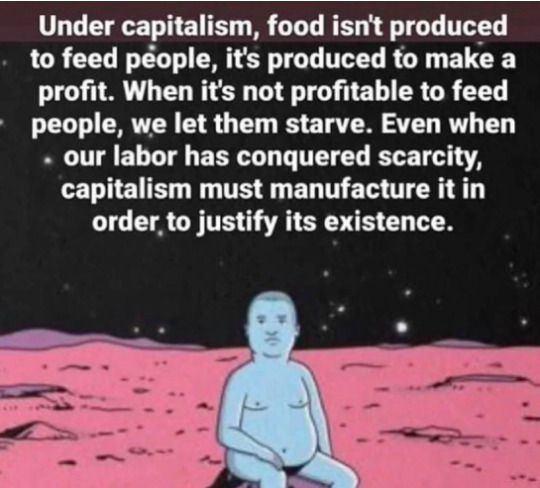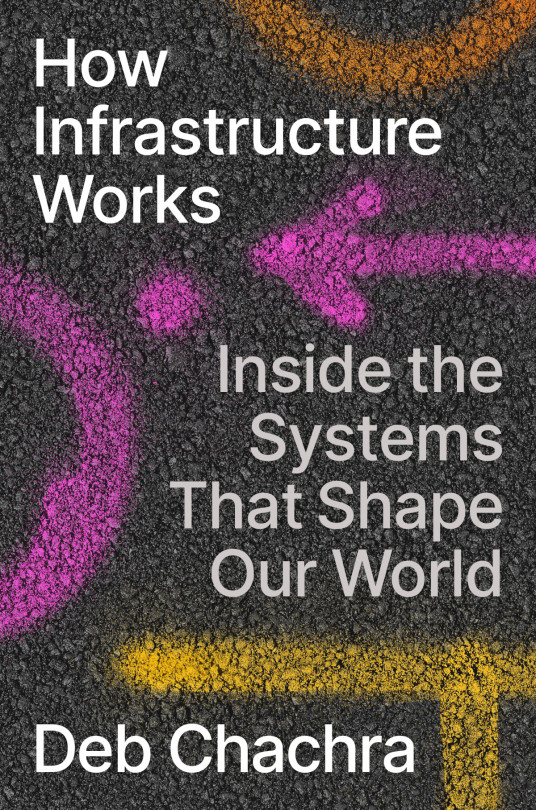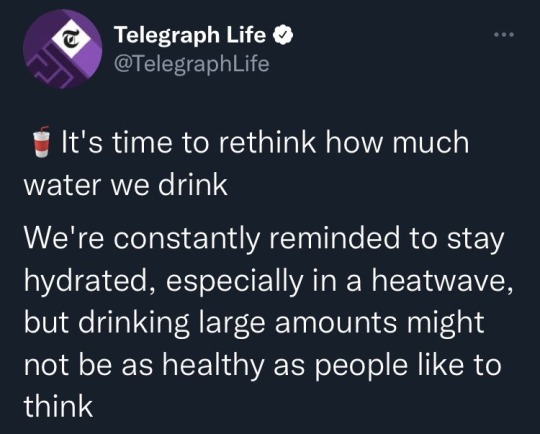#scarcity
Text
Degrowth scholarship notes that capitalist growth depends on the creation of artificial scarcity. Human needs can typically be satisfied either by means of relatively resource-efficient, non-commodified need satisfiers (for instance, public transit; food from a community kitchen), or by means of relatively scarce and resource-inefficient commodities (a privately owned car; a meal from a home-delivery service). Under capitalism, essential goods (housing, healthcare, transit, nutritious food, etc.) are commodified and access is mediated by prices that are often very high. To obtain the necessary income people are compelled to enter the capitalist labour market, working to produce things that may not be needed simply to access things that clearly are needed. Artificial scarcity of essential goods thus ensures a steady flow of labour for capitalist growth. It also creates growth dependencies: if productivity improvements (or recessions) lead to unemployment, people suffer loss of access to essential goods and growth is needed to create new jobs and resolve the social crisis. This dynamic explains why, despite capitalism's high levels of production and resource use, many basic needs remain unmet even in high-income countries. In this respect, capitalism is deeply inefficient and wasteful.
How to pay for saving the world: Modern Monetary Theory for a degrowth transition
880 notes
·
View notes
Text

#koth#king of the hill#bobby hill#watchmen#anti capitalist memes#funny#funny memes#memes#meme#dank memes#funny meme#dank#scarcity#post-scarcity
117 notes
·
View notes
Text
Deb Chachra's "How Infrastructure Works": Mutual aid, the built environment, the climate, and a future of comfort and abundance

This Thursday (Oct 19), I'm in Charleston, WV to give the 41st annual McCreight Lecture in the Humanities. And on Friday (Oct 20), I'm at Charleston's Taylor Books from 12h-14h.

Engineering professor and materials scientist Deb Chachra's new book How Infrastructure Works is a hopeful, lyrical – even beautiful – hymn to the systems of mutual aid we embed in our material world, from sewers to roads to the power grid. It's a book that will make you see the world in a different way – forever:
https://www.penguinrandomhouse.com/books/612711/how-infrastructure-works-by-deb-chachra/
Chachra structures the book as a kind of travelogue, in which she visits power plants, sewers, water treatment plants and other "charismatic megaprojects," connecting these to science, history, and her own memoir. In so doing, she doesn't merely surface the normally invisible stuff that sustains us all, but also surfaces its normally invisible meaning.
Infrastructure isn't merely a way to deliver life's necessities – mobility, energy, sanitation, water, and so on – it's a shared way of delivering those necessities. It's not just that economies of scale and network effects don't merely make it more efficient and cheaper to provide these necessities to whole populations. It's also that the lack of these network and scale effects make it unimaginable that these necessities could be provided to all of us without being part of a collective, public project.
Think of the automobile versus public transit: if you want to live in a big, built up city, you need public transit. Once a city gets big enough, putting everyone who needs to go everywhere in a car becomes a Red Queen's Race. With that many cars on the road, you need more roads. More roads push everything farther apart. Once everything is farther apart, you need more cars.
Geometry hates cars. You can't bargain with geometry. You can't tunnel your way out of this. You can't solve it with VTOL sky-taxis. You can't fix it with self-driving cars whose car-to-car comms let them shave down their following distances. You need buses, subways and trams. You need transit. There's a reason that every plan to "disrupt" transportation ends up reinventing the bus:
https://stanforddaily.com/2018/04/09/when-silicon-valley-accidentally-reinvents-the-city-bus/
Even the cities we think of as motorists' paradises – such as LA – have vast, extensive transit systems. They suck – because they are designed for poor people – but without them, the city would go from traffic-blighted to traffic-destroyed.
The dream of declaring independence from society, of going "off-grid," of rejecting any system of mutual obligation and reliance isn't merely an infantile fantasy – it also doesn't scale, which is ironic, given how scale-obsessed its foremost proponents are in their other passions. Replicating sanitation, water, rubbish disposal, etc to create individual systems is wildly inefficient. Creating per-person communications systems makes no sense – by definition, communications involves at least two people.
So infrastructure, Chachra reminds us, is a form of mutual aid. It's a gift we give to ourselves, to each other, and to the people who come after us. Any rugged individualism is but a thin raft, floating on an ocean of mutual obligation, mutual aid, care and maintenance.
Infrastructure is vital and difficult. Its amortization schedule is so long that in most cases, it won't pay for itself until long after the politicians who shepherded it into being are out of office (or dead). Its duty cycle is so long that it can be easy to forget it even exists – especially since the only time most of us notice infrastructure is when it stops working.
This makes infrastructure precarious even at the best of times – hard to commit to, easy to neglect. But throw in the climate emergency and it all gets pretty gnarly. Whatever operating parameters we've designed into our infra, whatever maintenance regimes we've committed to for it, it's totally inadequate. We're living through a period where abnormal is normal, where hundred year storms come every six months, where the heat and cold and wet and dry are all off the charts.
It's not just that the climate emergency is straining our existing infrastructure – Chachra makes the obvious and important point that any answer to the climate emergency means building a lot of new infrastructure. We're going to need new systems for power, transportation, telecoms, water delivery, sanitation, health delivery, and emergency response. Lots of emergency response.
Chachra points out here that the history of big, transformative infra projects is…complicated. Yes, Bazalgette's London sewers were a breathtaking achievement (though they could have done a better job separating sewage from storm runoff), but the money to build them, and all the other megaprojects of Victorian England, came from looting India. Chachra's family is from India, though she was raised in my hometown of Toronto, and spent a lot of her childhood traveling to see family in Bhopal, and she has a keen appreciation of the way that those old timey Victorian engineers externalized their costs on brown people half a world away.
But if we can figure out how to deliver climate-ready infra, the possibilities are wild – and beautiful. Take energy: we've all heard that Americans use far more energy than most of their foreign cousins (Canadians and Norwegians are even more energy-hungry, thanks to their heating bills).
The idea of providing every person on Earth with the energy abundance of an average Canadian is a horrifying prospect – provided that your energy generation is coupled to your carbon emissions. But there are lots of renewable sources of energy. For every single person on Earth to enjoy the same energy diet as a Canadian, we would have to capture a whopping four tenths of a percent of the solar radiation that reaches the Earth. Four tenths of a percent!
Of course, making solar – and wind, tidal, and geothermal – work will require a lot of stuff. We'll need panels and windmills and turbines to catch the energy, batteries to store it, and wires to transmit it. The material bill for all of this is astounding, and if all that material is to come out of the ground, it'll mean despoiling the environments and destroying the lives of the people who live near those extraction sites. Those are, of course and inevitably, poor and/or brown people.
But all those materials? They're also infra problems. We've spent millennia treating energy as scarce, despite the fact that fresh supplies of it arrive on Earth with every sunrise and every moonrise. Moreover, we've spent that same period treating materials as infinite despite the fact that we've got precisely one Earth's worth of stuff, and fresh supplies arrive sporadically, unpredictably, and in tiny quantities that usually burn up before they reach the ground.
Chachra proposes that we could – we must – treat material as scarce, and that one way to do this is to recognize that energy is not. We can trade energy for material, opting for more energy intensive manufacturing processes that make materials easier to recover when the good reaches its end of life. We can also opt for energy intensive material recovery processes. If we put our focus on designing objects that decompose gracefully back into the material stream, we can build the energy infrastructure to make energy truly abundant and truly clean.
This is a bold engineering vision, one that fuses Chachra's material science background, her work as an engineering educator, her activism as an anti-colonialist and feminist. The way she lays it out is just…breathtaking. Here, read an essay of hers that prefigures this book:
https://tinyletter.com/metafoundry/letters/metafoundry-75-resilience-abundance-decentralization
How Infrastructure Works is a worthy addition to the popular engineering books that have grappled with the climate emergency. The granddaddy of these is the late David MacKay's open access, brilliant, essential, Sustainable Energy Without the Hot Air, a book that will forever change the way you think about energy:
https://memex.craphound.com/2009/04/08/sustainable-energy-without-the-hot-air-the-freakonomics-of-conservation-climate-and-energy/
The whole "Without the Hot Air" series is totally radical, brilliant, and beautiful. Start with the Sustainable Materials companion volume to understand why everything can be explained by studying, thinking about and changing the way we use concrete and aluminum:
https://memex.craphound.com/2011/11/17/sustainable-materials-indispensable-impartial-popular-engineering-book-on-the-future-of-our-built-and-made-world/
And then get much closer to home – your kitchen, to be precise – with the Food and Climate Change volume:
https://pluralistic.net/2021/01/06/methane-diet/#3kg-per-day
Reading Chachra's book, I kept thinking about Saul Griffith's amazing Electrify, a shovel-ready book about how we can effect the transition to a fully electrified America:
https://pluralistic.net/2021/12/09/practical-visionary/#popular-engineering
Chachra's How Infrastructure Works makes a great companion volume to Electrify, a kind of inspirational march to play accompaniment on Griffith's nuts-and-bolts journey. It's a lyrical, visionary book, charting a bold course through the climate emergency, to a world of care, maintenance, comfort and abundance.

If you'd like an essay-formatted version of this post to read or share, here's a link to it on pluralistic.net, my surveillance-free, ad-free, tracker-free blog:
https://pluralistic.net/2023/10/17/care-work/#charismatic-megaprojects


My next novel is The Lost Cause, a hopeful novel of the climate emergency. Amazon won't sell the audiobook, so I made my own and I'm pre-selling it on Kickstarter!
#pluralistic#books#reviews#deb chachra#debcha#engineering#infrastructure#free energy#material science#abundance#scarcity#mutual aid#maintenance#99 percent invisible#colonialism#gift guide
259 notes
·
View notes
Text







#my art#sketchbook#gori cuddly carnage#gori#erika#spamelle#bugbo#jax#the amazing digital circus#fraggle rock#wembley fraggle#mokey fraggle#scarcity#addisons#angel hare#angel gabby#gobo fraggle#zooble
262 notes
·
View notes
Text









Damn, I wanna laugh, but I can’t even front like this isn’t happening in America too. Capitalism is a bitch.
2K notes
·
View notes
Text

Cover artwork for the new Scarcity record, The Promise of Rain
73 notes
·
View notes
Text
People with a scarcity mindset tend to view peoples accomplishments as a threat to their own success. They may feel jealous or resentful of someones achievements and try to undermine them.
They tell themselves things like:
“I don’t have enough.”
“I’ll never be able to afford that.”
“I can’t do that because I don’t have the resources.”
“There’s not enough to go around.”
“I’m not good enough to succeed.”
It’s important to recognize these thoughts and try to shift your mindset to one of abundance. Negative self-talk can have a significant impact on your mental health and well-being. It can lead to feelings of anxiety, depression, and low self-esteem. It can also make it difficult to achieve your goals and can lead to a lack of motivation.
You shift your mindset by:
Practice gratitude: Take time to reflect on the abundance you already have in your life, rather than focusing on what you lack.
Surround yourself with people who have an abundance mindset: People who have an abundance mindset tend to be more positive and optimistic, which can help you shift your own mindset.
Use creative visualization: Envision possibility and focus on what you want to achieve rather than what you don’t have.
Connect with nature: Spending time in nature can help you feel more expansive and abundant.
Focus on what you can do: Instead of focusing on what you can’t do, focus on what you can do and take decisive action towards your goals.
#scarcity#success mindset#high value mindset#success#confidence#successquotes#inspirational quotes#level up journey#personal growth#personal improvement#personal development
316 notes
·
View notes
Text

waiting for the cheque to clear, Yrsa Daley-Ward, from 'bone'
[text ID: What an odd, romantic time it is, if / you remember not to panic. / How many times has money almost / driven you mad? / You only need spices to throw in the / bowl / you only need flour to make some / kind of bread / and maybe somebody to lie in the / dark with. / Somebody's hands to touch.]
#poem#poetry#yrsa daley ward#waiting for the cheque to clear#somebody's hands to touch#scarcity#love language: touch#hands#mine
636 notes
·
View notes
Text
This is just my interpretation so here goes:
"Punk" as a suffix is inherently about anti-establishment. Therefore:
Cyberpunk -> Mega-corporations control the media and hoard resources and anyone not consuming mindlessly is a threat
Desertpunk -> Water is hoarded by either petty warlords or mega-corporations and the hero is often someone fighting or existing outside the system. Mad Max comes to mind but Tank Girl also. Basically, any setting where drinking water is treated as crude oil and all the conflict that entails.
Oceanpunk -> Not quite the opposite of Desertpunk. Instead of arid deserts, it's vast swathes of ocean with little islands (floating or stationary). An authoritarian regime controls or wishes to control the waters and its inhabitants. Land can be a resource or ancient technology from the "old world" can drive the conflict. One Piece, Waterworld, Flapjack, any setting where boats are used frequently as transportation and the setting. I wanna see more submarines in this genre.
Scavengepunk -> The oil's been used up and global war has rendered progress & production stagnant. People scavenge junk to meet their needs but this junk is very much a finite resource. The regime either hoards what they scavenge or forbid the scavenging of certain goods, fearing it could upset the power balance. People who can actually manufacture or invent new tech might be persecuted cuz being able to build your own stuff instead of scavenging just disrupts the status quo. These types of stories usually have 1 of 2 MacGuffins: the main hero restarts some dangerous old-world tech or invents something powerful. Mortal Engines is technically scavengepunk and steampunk combined.
#dystopia#scavengepunk#oceanpunk#steampunk#punkpunk#desertpunk#mad max#anti establishment#post apocalyptic#oc#Mortal Engines#mortal engines#flapjack#tank girl#lori petty#tank girl comic#comics#mad max fury road#postapocalypse#scarcity#post scarcity#waterworld#one piece#cyberpunk#cyberpunk aesthetic#cyberpunk 2077#island#the misadventures of flapjack#dystopian films
42 notes
·
View notes
Text
Human needs can typically be satisfied either by means of relatively resource-efficient, non-commodified need satisfiers (for instance, public transit; food from a community kitchen), or by means of relatively scarce and resource-inefficient commodities (a privately owned car; a home-delivery meal). Under capitalism, commons and public goods are commodified and an artificial scarcity is imposed to ensure that these goods can be profitable when sold. In order to obtain the income to access these goods, people are obliged to compete with one another in the labour market to generate production for capital. Put differently, people are forced to produce many things that no one needs, in order to access things that everyone actually does need. Artificial scarcity is, in this way, the engine of perpetual growth. This dynamic explains why, despite the extraordinary productive capacity of capitalism – and despite extraordinarily high levels of aggregate resource use – much of the human population is nonetheless unable to meet basic needs. When it comes to meeting human needs, capitalism is deeply inefficient and wasteful.
How to pay for saving the world: Modern Monetary Theory for a degrowth transition
171 notes
·
View notes
Text

#plenty#abundance#scarcity#the only tragedy of the commons was its enclosure#fuck capitalism#murray bookchin#anarchy
632 notes
·
View notes
Text
Being poor reduces a person's cognitive capacity more than going a full night without sleep.
Scarcity by Sendhil Mullainathan and Eldar Shafir
10 notes
·
View notes
Text
Don’t chase people. Be yourself, do your own thing, and love people. The right people — the ones who really belong in your life — will come to you, and stay.
Will Smith
#Will Smith#struggle love#the chase#emotionally unavailable#emotional unavailability#clinging#clingy#neediness#dependency#scarcity#authenticity#alignment#compatibility#incompatibility#relationship#love#breakup#heartbreak#moving on#recovery#healing#letting go#detachment#independent#quotes
375 notes
·
View notes
Text
Tumblr really is about the haves and the have nots. Every poll I've seen has tens of thousands of votes because they're novel and rare, but the second they roll out for everyone, no one will give a shit anymore. The poll bubble will burst, they'll be worthless, you'll be lucky if even a handful of your closest mutuals bother to click on it, much less have it breach containment and go viral. I just want to know how @staff chose which lucky bastards got to have the polls at their fullest potential? This is the peak, enjoy is while it lasts.
#polls#tumblr polls#poll#tumblr poll#vote#bubble#scarcity#economics#the economy#tumblr economy#the haves and the have nots
72 notes
·
View notes
Text

Imagine how many people Billionaires could feed!
#good#morning#good morning#good morning message#good morning image#good morning images#good morning man#the good morning man#the entire morning#sunday#happy sunday#resources#scarcity#scarcity is a myth#boundless resources#renewable energy#what makes sunday so special
32 notes
·
View notes
